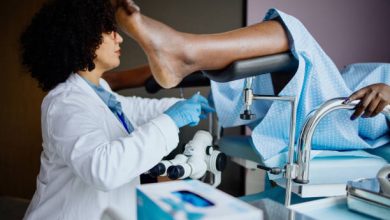Doctors Said It Was Just Pregnancy, But It Was Cancer: ‘Trust Your Own Body’


Pregnancy is often a time of joy and anticipation, but for some women, it can also mask symptoms of a silent threat: colorectal cancer (CRC). Symptoms like changes in bowel habits, abdominal discomfort, and fatigue can easily be attributed to the rigors of pregnancy or postpartum recovery. A startling trend is emerging – CRC rates are on the rise among younger adults, with a 15 percent increase in cases among those aged 18-50 since 2004.
Georgia native Jenna Scott knows all too well about this concerning trend. Scott’s journey with colorectal cancer began unexpectedly during her pregnancy with symptoms that started as seemingly normal discomforts turning into a harrowing experience of misdiagnoses and delays in treatment.
“The symptoms first appeared when I was about seven months pregnant, and I vividly recall the moment I realized something was wrong. It was during a trip to the restroom, which turned into a scene I can only describe as a bloodbath,” Scott tells BlackDoctor.org. “Naturally, my immediate concern was for my baby’s well-being. We promptly contacted my doctor, who reassured me that everything was fine and attributed the bleeding to hemorrhoids—a common issue during pregnancy.”
RELATED: “No More ‘Do It Later’”: Deondre Williams on Life After Colon Cancer
As the discomfort persisted, Scott began to experience severe abdominal pains and insomnia. Although she raised concerns, her symptoms were once again dismissed as typical pregnancy symptoms.

“Trusting my healthcare providers, all of whom were white males, I accepted their explanations, believing that my experiences were just part of the pregnancy journey. Despite ongoing symptoms postpartum, including persistent bleeding, I was repeatedly assured that all was well,” Scott adds. “I feel like the least my obstetrician-gynecologist could have done was provide me with information or suggest precautions. It felt like they put me in a box—seeing a young African American woman in the office for the first time pregnant and assuming everything was fine because I was just pregnant. There’s this stereotype that we might exaggerate more than others, but I was not exaggerating at all.”
After giving birth to her son, Scott continued to experience symptoms. Despite seeking help from her healthcare providers, she faced a series of misdiagnoses and delays in receiving appropriate care. It wasn’t until a year after her initial symptoms and the decision to seek a second opinion that Scott was finally diagnosed with stage 4 colorectal cancer.

“This decision led to a series of tests, including blood work and medications to rule out various conditions like IBS. However, when these treatments failed to alleviate my symptoms, I was referred to a GI [gastroenterologist] specialist. It was during the subsequent colonoscopy that my world was turned upside down with a diagnosis that no one, including myself, anticipated: cancer,” Scott recalls. “It was about three weeks between my diagnosis and meeting my oncologist for the first time. We had thought it might be stage 1 or 2, but my oncologist’s first words were, ‘You have stage 4,’ a complete shock. After that, everything seemed to blur together.”
Scott’s initial reaction to the diagnosis was a mix of shock and disbelief that her life was about to change so drastically.

“I convinced myself that this was just a minor setback, akin to a cold, and that I would soon return to my normal routine,” she shares adding that all of her thoughts were consumed by the fear that her son wouldn’t remember her if something happened to her.
Fortunately, Scott had a strong support system by her side.
“I remember leaving the appointment and deciding to visit a sunflower patch near my house—a place I’d never been before. It was a simple, beautiful moment, picking sunflowers, taking pictures, and enjoying the day with my mom and husband…Their support has been invaluable,” Jenna adds. “My husband, in particular, has been incredible. We were still newlyweds when I was diagnosed, and our son was just a baby. Despite this, he stepped up immediately, researching tirelessly and accompanying me to every doctor’s appointment. He never missed a




